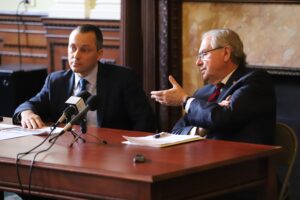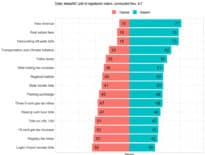
House Speaker Robert DeLeo (right) and Ways and Means Committee Chair Rep. Aaron Michlewitz (left) address reporters in this file photo. Photo by Sam Doran | State House News Service.
With just days remaining until the legislature recesses until 2020, House Speaker Robert DeLeo said Thursday he’s decided to push back his timeline for a hotly anticipated debate over new revenue for transportation until next year.
DeLeo and Ways and Means Chairman Aaron Michlewitz told the News Service that their commitment to passing legislation to raise new funding for transportation infrastructure has not waned.
“After reviewing this with myself, the chairman [Michlewitz], Chairman [Mark] Cusack and Chairman [William] Straus, we decided that it’s better that we try to get this right than to try to comply with, I guess you could say, a somewhat arbitrary deadline,” DeLeo told the News Service.
The legislature is set to recess on Nov. 20, and resume formal sessions in January. While the House and Senate will continue to meet in informal sessions through December, anything that requires a roll call vote must wait.
DeLeo and House leaders in March and April signaled plans for a fall debate on transportation revenues, and the urgency associated with that debate was heightened in recent months by failures on the MBTA and congestion conditions on the roads that drivers are finding more and more intolerable.
Two weeks ago, DeLeo convened a group of his top deputies to gauge where in the process House leaders were in putting a package together. Majority Leader Ronald Mariano said after the meeting that they had started to “put some numbers next to the strategies,” but would likely need a few more weeks.
Two days later, a coalition of business groups, led by Greater Boston Chamber of Commerce President Jim Rooney, shared the results of a survey of major Massachusetts employers on what types of new taxes or revenue enhancers they could support to improve public transit and reduce congestion.
The release of the information, including the chamber’s support for a 15-cent gas tax increase, sparked an intensified interest among House members to share their opinions with leadership, DeLeo said.
“Quite frankly, I think it’s very, very important that we try to get this in the best possible form as possible and I think it’s going to take more time for us to be talking with some of the members, who are probably a little more engaged now and want to talk a little more about it,” DeLeo said.
Straus said the team working on the revenue package has ruled some options in and out.
“We got closer and [got] more things to consider at the same time,” Straus said about the past few weeks, suggesting the public attention paid to the fact that leaders were zeroing in on a plan “brought a number of the groups who had been watching but not communicating from outside the building into the discussion.”
DeLeo said he’s also given his commitment previously to support transportation improvements in all regions of the state, but some members have been seeking reassurances.
“It’s not only the money. Some people also want to talk about the bill as a whole,” DeLeo said. “There’s a concern I hear from other parts of the state that with what’s going on with the T they’re concerned that this is going to be more T-centric than they want it to be.”
The Winthrop Democrat said he’s “shooting for January now” to produce and vote on a revenue bill in the House, acknowledging that some legislators will be unhappy about the prospect of voting for tax increases in an election year.
“I think that’s always an issue, yes, but I think there also seems to be a commitment I get from most members, anyways, that something has to be done, that we just can’t keep on going in the way we’re going with our transportation system,” DeLeo said. “There seems to be more of a commitment to making sure we get something done as opposed to sitting on the sidelines and just letting another year pass without doing that.”
“Our commitment to the issue is still very strong, is still there. Our timeline is just going to be a little different than we initially perceived it to be,” said Michlewitz, backing up the speaker.
Gov. Charlie Baker, a Republican, has said that he opposes increasing the gas tax, and would rather see the legislature simply pass his $18 billion, multi-year bond bill that invest significant new funding into roads, bridges and public transit, but will not pay for any of the ambitious fixes transit advocates and Greater Boston leaders say the region needs to make a dent in the congestion problem.
The Baker administration is also pursuing a multi-state initiative to cap carbon emissions from vehicles and generate potentially hundreds of millions of dollars for the state from the sale of carbon allowances to invest in clean transportation programs, however revenue from that proposal is uncertain and will not begin to flow for several years.




 |
| 

